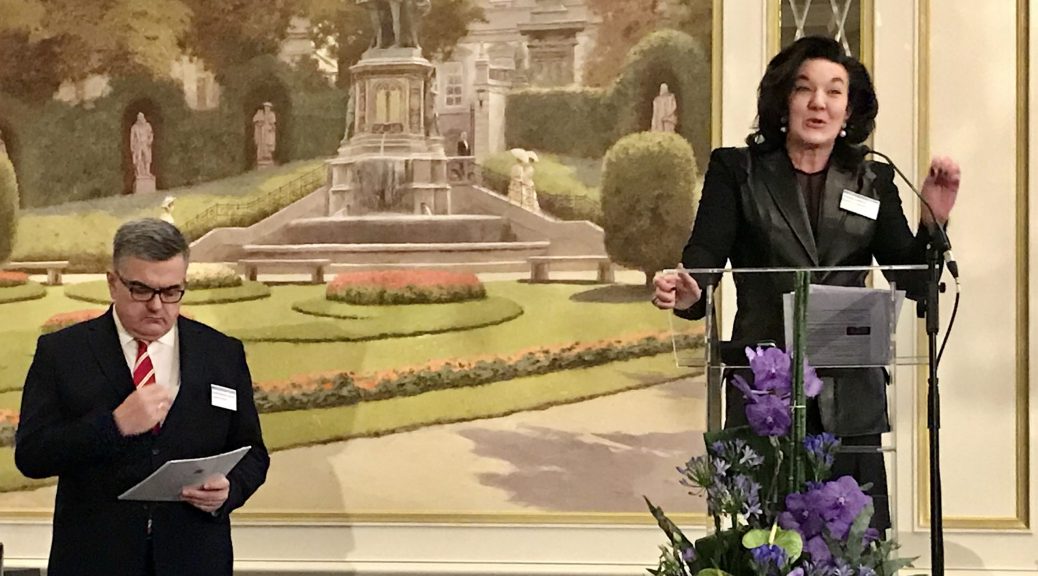
Conference Debriefing (17): Antitrust in Times of Upheaval – CRA 2019
The conference circuit picked up speed again now that the end of this remarkable year is near. We were not able to attend everything out there but obviously if catering promises to be good Rupprecht Podszun is never too far – and so here is his Conference Debriefing from Woodstock!
Name of Conference: Antitrust in Times of Upheaval
Place & Time: Steigenberger Wiltcher’s Brussels, 10 December 2019
Host: CRA, the economic consultancy, but really it is The Cristina Caffarra Show
Audience: The list of participants has something like 1000 people on it (I stopped counting at 14 and had only reached DG COMP’s Deputy Chief Economist Albaek, Svend at that point…). Isabelle de Silva, the French top enforcer, said that this was like the Google of conferences – so big. (CRA replied by Twitter that there are less complaints though.)
Before we start with the conference: We have a new Director General!
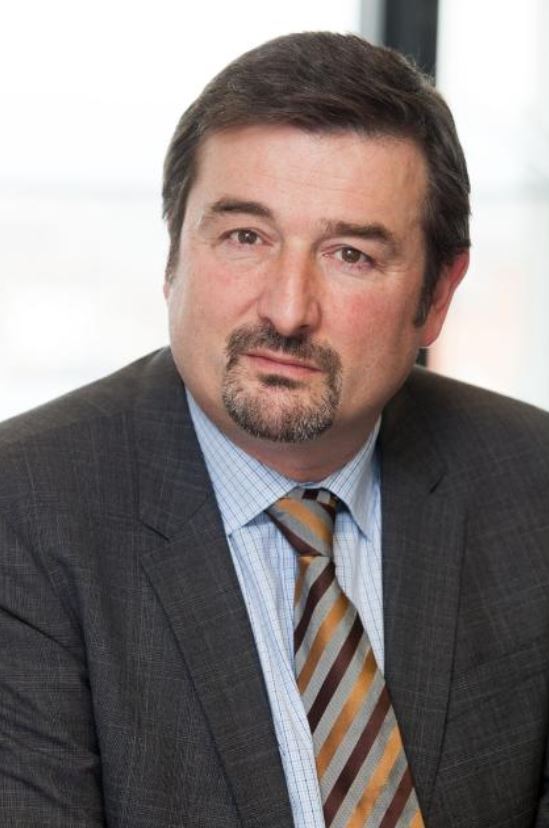
Yepp, that is the news of this morning: Olivier Guersent, currently Director General in DG FISMA (that has something to do with finances) returns to DG COMP as the successor of Johannes Laitenberger who became a judge at the Court. And some will still remember him – he joined the Merger Task Force as a national expert from his native France in 1992, and he never left Brussels again. He worked with Commissioners van Miert, Kroes and Barnier (the latter one in DG Market), so he really knows his way around in competition law. In 2015, he became Director General in charge of financial stability and capital markets and he had also been tipped as Ursula von der Leyens Secretary-General. This seems to be his latest speech (on capital markets). Bienvenue à nouveau!
Now, which Brussels conference are you actually reporting on? The one with Philip Marsden?
He is in all conferences, but you are probably referring to the one organised by Chillin’ Competition on Monday. That one seems to have had at least two really remarkable moments: Firstly, Philip Marsden, the top-notch entertainer on the stages of antitrust, delivered a rap (literally, a rap!) that you may watch here. (*New link to a better video added!*)
Secondly, Margrethe Vestager announced she would review the 1997 Market Definition Notice.
That’s about time!
True. I found it pretty interesting, how this was received by Brussels media. When I hear that the Commission looks at market definition, I expect that the issue of growing convergence is addressed so that we move out of the trap of neatly defined narrow markets. (I am in favour of a very open, evolutionary concept of market definition, see, e.g., in this book that I like very much…#ad)
Brussels media however interpreted Vestager’s announcement as “music to the ears of those who have asked the EU to take a more global view of competition cases” (Politico), i.e. Ministers Peter Altmaier and Bruno Le Maire who were unhappy with market definition in Siemens/Alstom. We should probably be on guard that opposition to mergers with a chillin’ effect is not made more difficult through the backdoor of a revised market definition notice. Massimo Motta and Hans Zenger – at our conference – provided some comfort when saying that the new market definition notice will not bring big changes anyway.
Vestager, in her speech, said that digitisation caused an “earthquake in our markets”. That is a remarkable way to put it, isn’t it?
Well, this brings us to the conference organised by CRA with this massive crowd – it had the catchy “upheaval” in its title. This goes back to a remark by Radicalxchange activist Glen Weyl who likes to argue with enslaved peasants of former days when discussing the grip of monopoly power of the digital lords.
DG COMP economist Hans Zenger labelled this conference “the Woodstock of competition law”. Yet, style-wise, I think that only economists Florian Ederer (co-author of the famous “killer acquisitions” paper) and maybe Berlin’s Tomaso Duso would have qualified for the Crosby Stills Nash & Young revival band. Zenger had a point though: Woodstock, this I learn from Wikipedia, was the tipping point when hippie music was finally established as mainstream. And if you saw that impressive line-up of top enforcers in that Steigenberger Ballroom (not exactly a muddy meadow) – Coscelli, de Silva, Mundt, Steenbergen, Madero, Snoep to name but a few – you could really think that this conference must be mainstream while many of the ideas floated sounded more “hippie”.
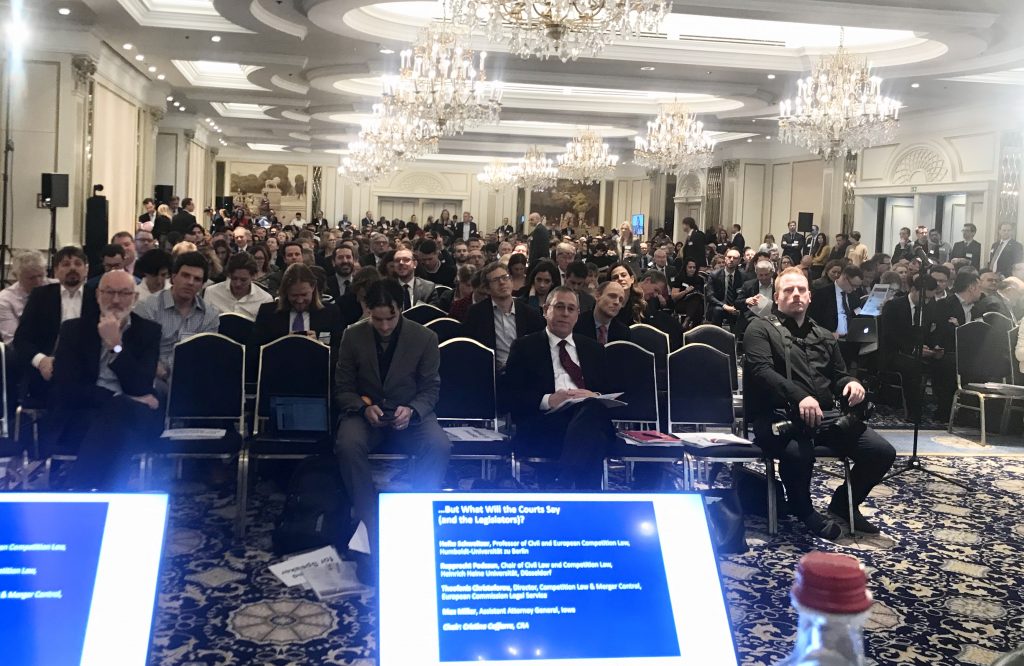
I don’t want you to get taken away by that Woodstock analogy, but now that you are on it… what was the tune people sang along to?
If I had to pick from the Woodstock set list, it’s probably “You can make it if you try” by Sly & the Family Stone: there was a lot of encouragement for tougher enforcement, partly due to a list of invitees who stand for exactly this. Enforcers can make it if they try – design more effective rules, step up enforcement, make Google, Amazon, Facebook shiver. I guess the GAFA-representatives in the room (yes, they were there) probably took their hands later in a self-help group to sing “We shall overcome” together.
So there is consensus nowadays that GAFA is the bad guys and more action needs to be taken?
If you place Glen Weyl and Barry Lynn (from the Open Markets Institute) in a panel do not expect cosy times for monopolists. Stratechery’s Ben Thompson called for a closer look at the differing business models of these operators of ecosystems, yet this conference took the broader view and skipped some of the details.
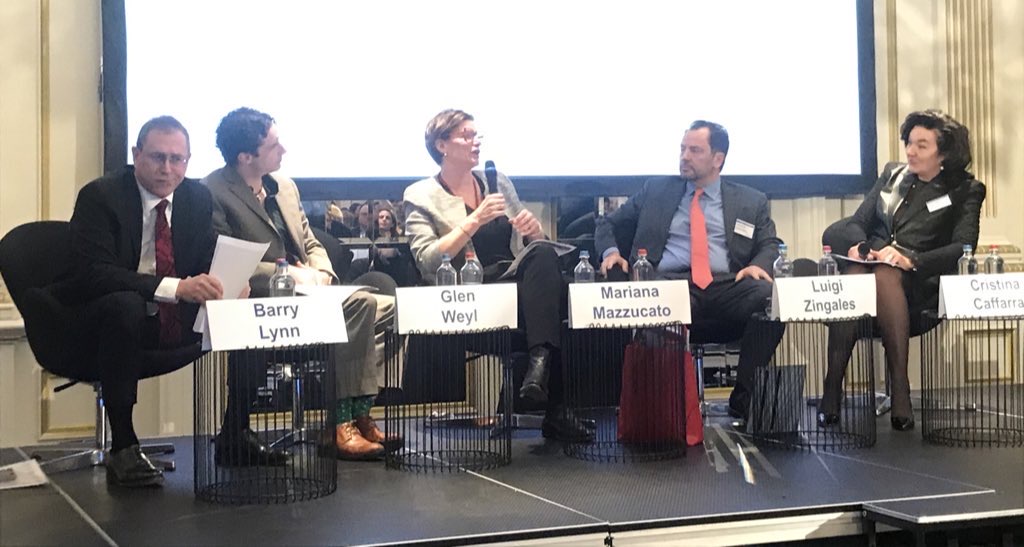
You certainly do not have to agree to all that Lynn and others say, but they have a point in placing antitrust enforcement into the larger picture of the digital transformation. Democracy is at risk due to fake news and societal rifts? Companies are able to monitor you 24/7 and know you better even in your most intimate secrets than your partner? They are able to control the information you get? You have a mobile phone, a wearable and a smart home assistant? If you nodded, the next question is: what is at the root of it? Answer: economic power. Question: What is the field of law that regulates economic power? Answer: Antitrust law. Quod erat demonstrandum.
Even if you see these people as a bit off-track from your daily Brussels case routine, they have valid points and they have a voice. Plus: They get a lot of support from really sought-after economists. There was one stellar panel (if all male) of ace econ scholars: Massimo Motta, Hans Zenger, Thomas Wollmann, Florian Ederer, Luis Cabral, Tomaso Duso, Luigi Zingales… sitting in one row.
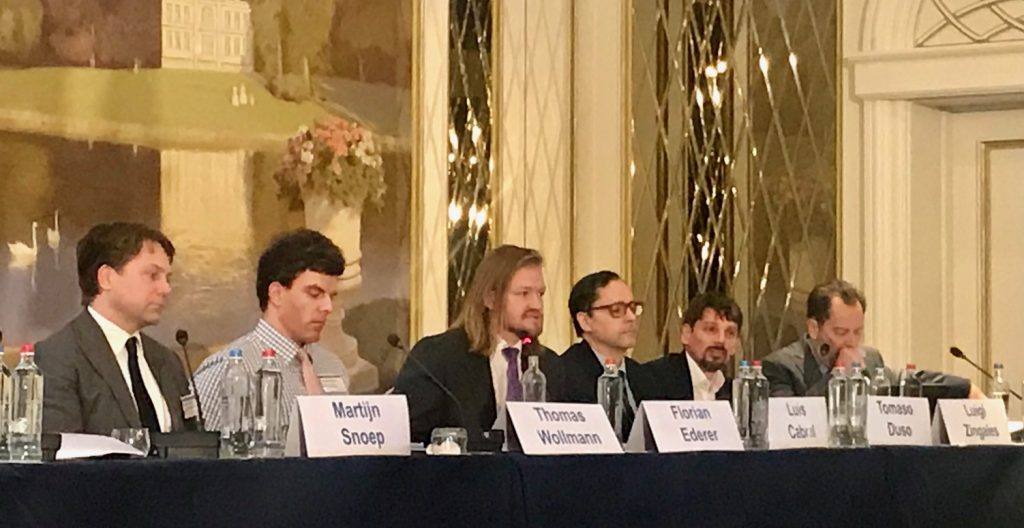
And all of them, with varying degrees of enthusiasm, supported tougher enforcement informed by empirical research, behavioural studies or innovation economics. They no longer worry about over-enforcement, but fear that under-enforcement brings the economy down. Just as an example, Thomas Wollmann from Chicago Booth says that we see “stealth consolidation” in many markets where merger control is weak – and even small M&A activity may have a large impact if the market is already highly concentrated. Luis Cabral from NYU, one of the more cautious people, shattered some myths regarding innovation, speaking of the “in the shadow of Google”-effect for innovators in the Silicon Valley. Obviously, some of their findings are heavily influenced by the comparably weak antitrust enforcement in the United States.
I wonder how this goes down with the U.S. guys…
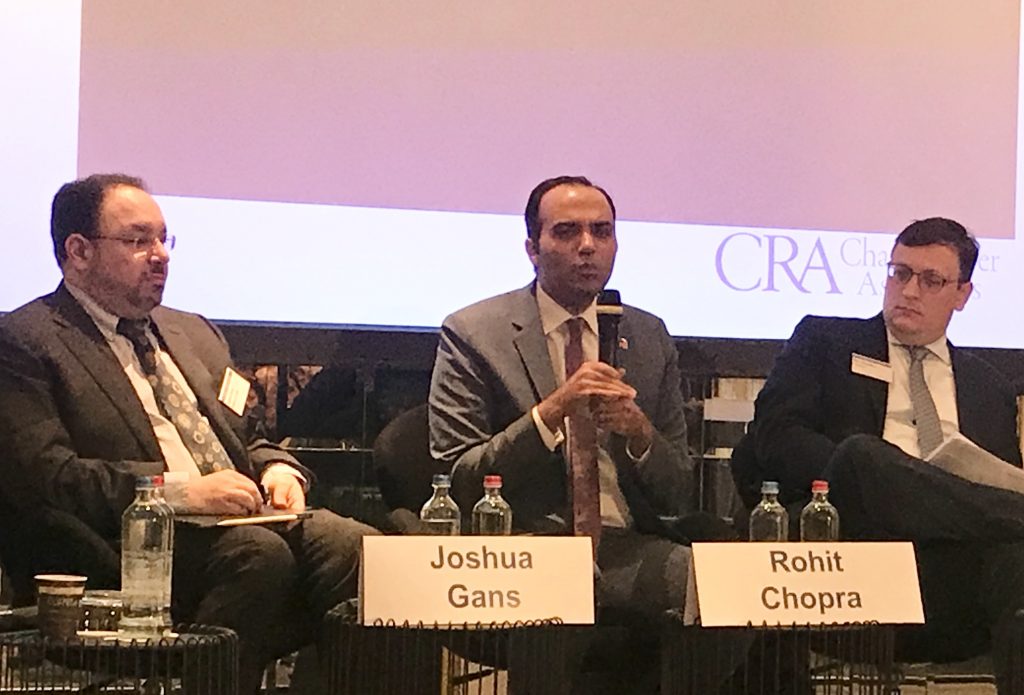
I can tell you, because they were there! Rohit Chopra, a Commissioner of the U.S. Federal Trade Commission, turned out to be a really tough pro-enforcement advocate, but then, he often writes the dissenting opinion in the FTC. Aaron Hoag, on the other hand, a representative of the U.S. Department of Justice, barely said a word. Let’s hope he had at least a good tourist programme in Brussels. Max Miller, Assistant Attorney General of Iowa…
Hang on – I am really into international stuff, but the Assistant Attorney General of Iowa… I mean we are taking it that far, now?
You are a gawk. For one, Iowa had the first antitrust law in the United States: the “Act for the punishment of Pools, Trusts, Conspiracies, and as to Evidence in such cases”, dating back to 1888, while the Sherman Act was only passed in 1890. (Read the Iowa Act here, it’s really good!)
Two, with the DoJ rather tongue-tied, the federal states took over. Max Miller, who is a Skadden Arps-trained antitrust lawyer, is one of the people going after big tech. 48-plus-2 state attorney generals in the United States joined forces to tame the techies. This system was explained by General Peterson. That sounded so good: Doug Peterson is the Attorney General of Nebraska. We learned you properly address such people as “General”. When the General raised his Mid-West voice and when he explained very calmly and clearly how the multi-state investigation into big tech develops into the “perfect storm” (his words), I could not help but to think of Clint Eastwood.
Probably a way to go…
Absolutely, if you follow Thomas Philippon from NYU. His book “The Great Reversal” is the one to read these days (after having finished Daniel Zimmer’s “Möbius” of course). Jason Furman (yes, the Harvard professor from the Furman Report!) introduced Philippon’s book as “excellent”, and CMA Chief Executive Andrea Coscelli confirmed he had just read it. It seems to be a must-read.
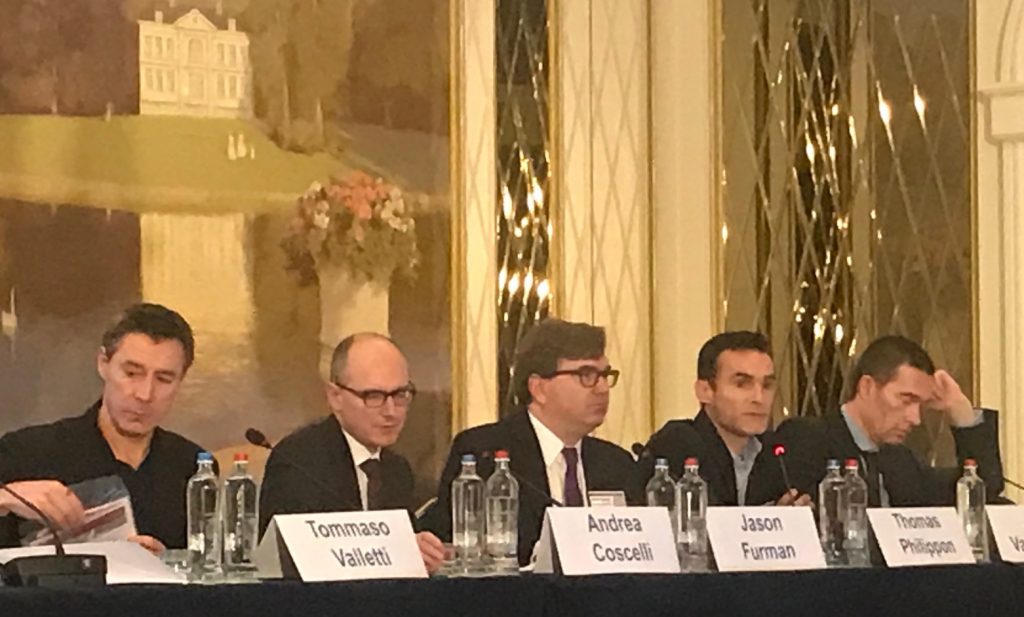
Philippon states that U.S. markets are highly concentrated – the former free market eldorado has been reversed. He attributes a lot of the current problems to aggressive anti-antitrust lobbying by some firms. His intervention put capture of regulators into the spotlight – one of the many institutional issues standing in the way of the “upheaval” in antitrust.
But it is the state to fix things?
Some say so. Mariana Mazzucato started her talk with quoting Karl Marx, and according to her, Schumpeter’s writing was only a variation of Marx (or so). Well, everyone chooses his or her own points of reference… Her bottom line is that all great innovation stems from state-funded projects – what would Google be without Al Gore inventing the Internet public funds sponsoring the technology we now know as the Internet? Many apps or automated driving depend on GPS – a state-funded innovation. So, for Mazzucato there is a legitimacy to tax and control those that use these technologies, and there are good grounds to devise intelligent state intervention in order to foster such ground-breaking innovation. MIT’s John Van Reenen goes into that direction, too.
Someone (was it Tom Valletti, who according to his own words is still detoxifying from the Brussels bubble after his stint as a Chief Economist?) said he would go for industrial policy if John Van Reenen oversaw it. Others were hesitant. Jason Furman favoured trade over aid. So, I think the majority still believes in the power of free. Or, as Furman put it: EU and US have never been good at industrial policy, so why should we try it now?
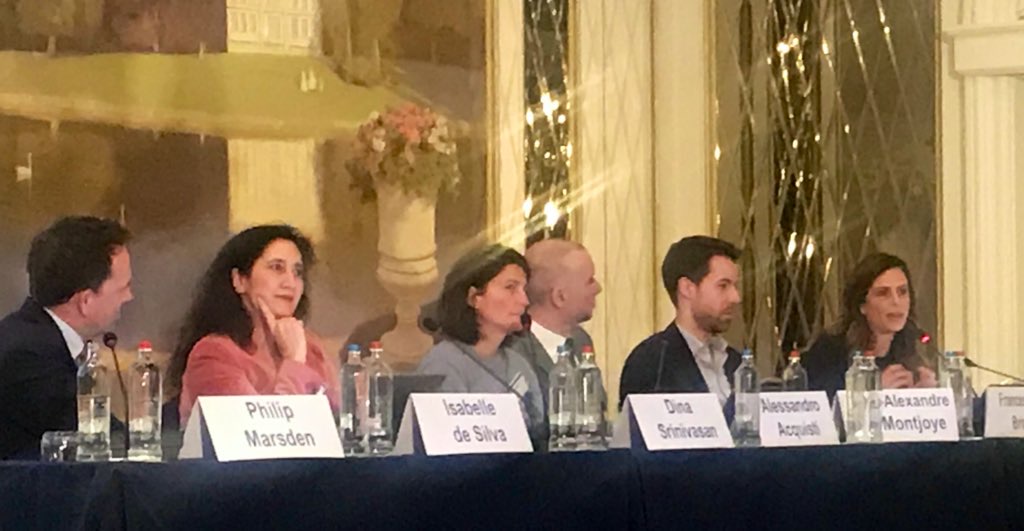
Speaking of the role of the state, I liked a vision that was put forward by Francesca Bria who is new to the antitrust circuit (but I am sure she is a hot ticket now): Bria was the Chief Digital Officer of Barcelona, one of the most touristy smartest cities in Europe. She sketched the Barcelona public digitisation as a project where the state on its very home turf may show how it goes: Where the state acts as a service provider in town with huge amounts of data, sensors, public services etc. it should create an environment respecting privacy and competition. Bria put the focus on data sovereignty for citizens. This translates into the economic value of private data handed to these citizens. If you combine that with open interfaces, portability, fair chances for operators, a smart city may be a hub that serves as a model for integrating competition principles and privacy in a smart environment. If Barcelona can do it, Facebook could do it, too. Interesting, at least, to remind the public bodies that are now venturing into the field of data that they have to respect competition and privacy, too.
So, we are at the Facebook case finally!
Necessarily so. Ever since Margrethe Vestager conceded that the remedies in Google Shopping have not proved helpful so far, Facebook is the case winning the award for Most Targeted Remedy.
Bundeskartellamt’s Andreas Mundt was on a panel, and he made a self-confident impression even though the remedy has not yet been put into practice after that famous ruling by the Düsseldorf court in interim proceedings. I held my breath when President Mundt said: “We will change the business models.” Challenged on this rather radical sentence by awesome host Cristina Caffarra Mundt, smiling subtly at the provocative effect of his words, clarified: “If a business model only works with anti-competitive features we will change that since we will prohibit those anti-competitive features.” Sigh.
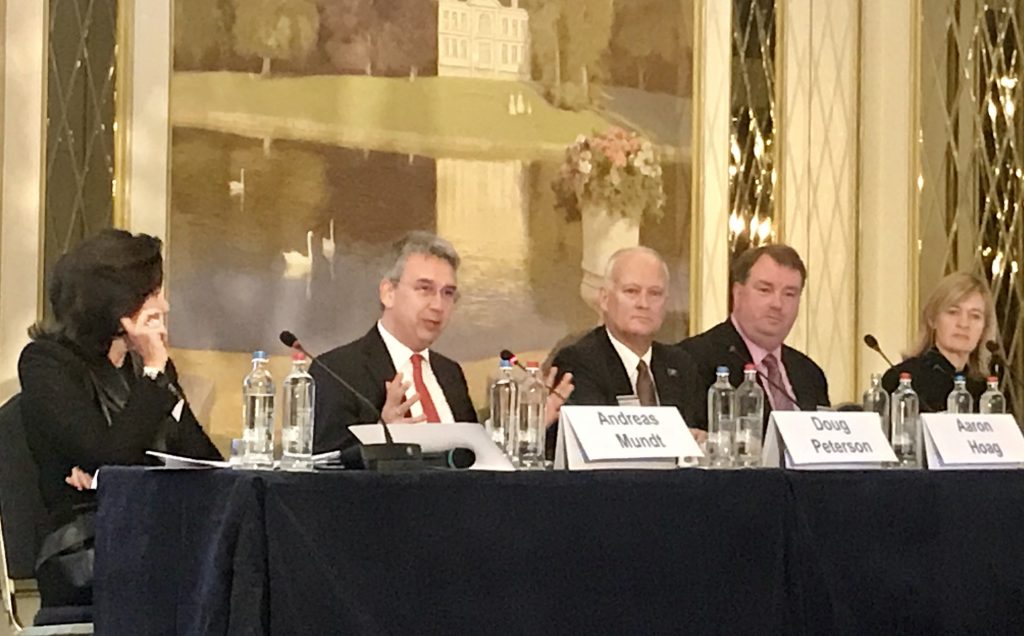
Isabelle de Silva, head of the French agency, guided our attention to the case of Engie from 2014/2017 where her Autorité opened up the incumbent’s database with customer data to other suppliers. She described this as a model approach to reconciling privacy issues with competition enforcement.
Heike Schweitzer and you also were on a panel to explain, well, Germany.
Sort of. Heike gave a brilliant account of the Facebook saga, we both tried to explain how the German legislator now tries to pioneer in the field of digital (in my view, we neglect that this reform act is not just about taming GAFA but equally important tries to enable German European companies to play in the field of Internet of Things). We also had to deal with that delicate question whether the courts put a brake on reform. Yes, they do, I think, but that is not entirely bad – it is their job. Still, some institutional reforms would be desirable.
On Facebook, we really need to give kudos to the Bundeskartellamt: That case is so intriguing… when I took the Thalys train home after the conference to that other capital of antitrust (Düsseldorf, obviously!) I found myself squeezed in between a lawyer from the Bundeskartellamt and a lawyer from the German Monopolies Commission. To the pleasure of all other passengers in that coach we explained to each other what we make of Facebook, and with three German lawyers we had at least five different views. In my view…
Okay, okay, I will read your next paper or just wait for the next court ruling on it. One more thing: Did the Commission actually take the stand?
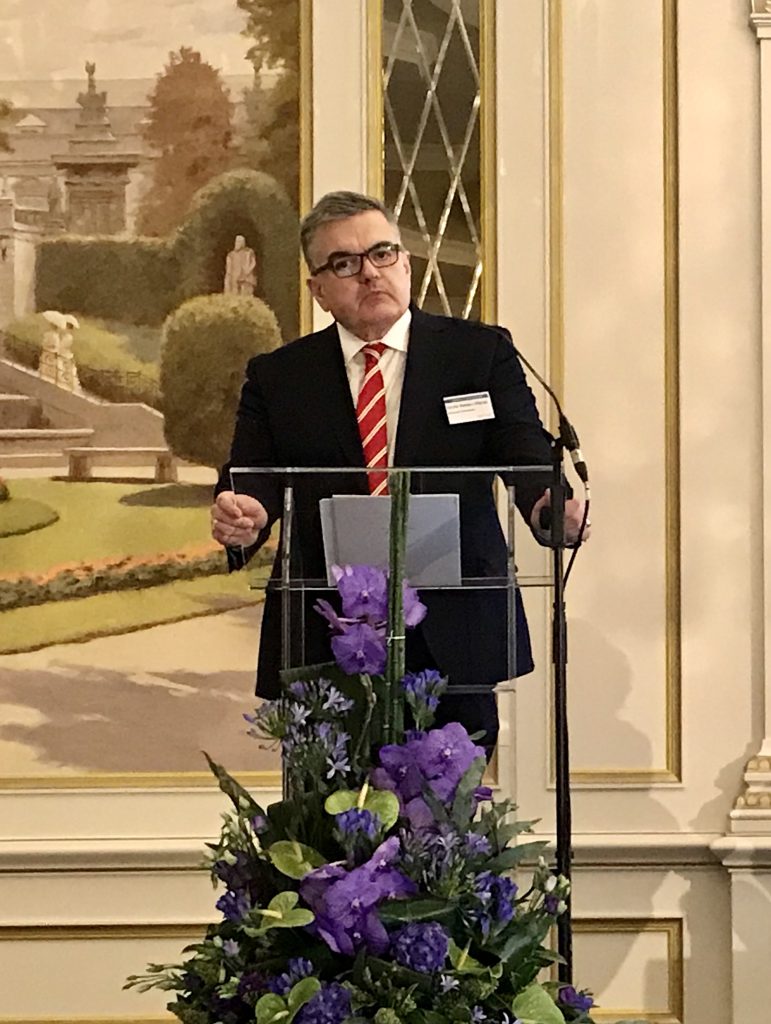
Cecilio Madero Villarejo, the Acting Director General, gave the keynote, and of his speech, I noted three things: Firstly, DG COMP sticks with the approach to make us believe that the Google cases and others present “old wine in new bottles”. I am not convinced, and I find that strategy too shy: I think it would be easier to win over judges if you frankly stated: Listen, these are new phenomena in the economy, and thus we had to come up with new concepts under Art. 102 TFEU. Fingers crossed, it works nonetheless. Secondly, Madero emphasised that timely intervention – without compromising the rights of defence – will be a top priority for the second Vestager term. Thirdly, and very much in line with Theofanis Christoforou from the Legal Service in a later panel, Madero criticised the standard of proof: There must be a reasonable limit, so he said, to the standard of proof that we need to meet. Now, that’s a difficult one, I think, and without daring to ask I wondered whether that actually translates to “There must be a reasonable limit to economics in our cases.”
If I understood you correctly, you wanted to say “old-fashioned economics”.
You’re a quick learner!
Do say: “If we will not endure a king as a political power, we should not endure a king over the production, transportation, and sale of any of the necessities of life.” (John Sherman as quoted by Luigi Zingales)
Do not say: “No one understands big tech!” (Joshua Gans quipping when asked “Do regulators understand big tech?”)
One thought on “Conference Debriefing (17): Antitrust in Times of Upheaval – CRA 2019”